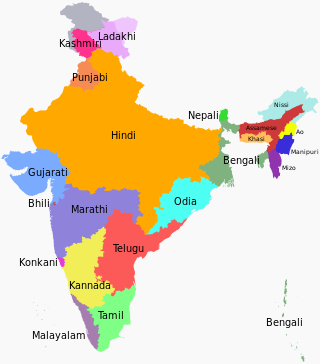

Federal level[edit]
Prior to Independence, in British India, English was the sole language used for administrative purposes as well as for higher education purposes.[4]
In 1946, the issue of national language was a bitterly contested subject in the proceedings of the Constituent Assembly of India, specifically what should be the language in which the Constitution of India is written and the language spoken during the proceedings of Parliament and thus deserving of the epithet "national". Members belonging to the northern parts of India insisted that the Constitution be drafted in Hindi with the unofficial translation in English. This was not agreed to by the drafting committee on the grounds that English was much better to craft the nuanced prose on constitutional subjects. The efforts to make Hindi the pre-eminent language were bitterly resisted by the members from those parts of India where Hindi was not spoken natively.
Eventually, a compromise was reached not to include any mention of a national language. Instead, Hindi in Devanagari script was declared to be the official language of the union, but for "fifteen years from the commencement of the Constitution, the English Language shall continue to be used for all the official purposes of the Union for which it was being used immediately before such commencement."[4]
Article 343 (1) of the Constitution of India states "The Official Language of the Union government shall be Hindi in Devanagari script."[5]:212[6] Unless Parliament decided otherwise, the use of English for official purposes was to cease 15 years after the constitution came into effect, i.e. on 26 January 1965.[5]:212[6]
As the date for changeover approached, however, there was much alarm in the non-Hindi-speaking areas of India, especially in Kerala, Gujarat, Maharashtra, Tamil Nadu, Punjab, West Bengal, Karnataka, Puducherry and Andhra Pradesh. Accordingly, Jawaharlal Nehru ensured the enactment of the Official Languages Act, 1963,[7][8] which provided that English "may" still be used with Hindi for official purposes, even after 1965.[4] The wording of the text proved unfortunate in that while Nehru understood that "may" meant shall, politicians championing the cause of Hindi thought it implied exactly the opposite.[4]
In the event, as 1965 approached, India's new Prime Minister Lal Bahadur Shastri prepared to make Hindi paramount with effect from 26 January 1965. This led to widespread agitation, riots, self-immolations, and suicides in Tamil Nadu. The split of Congress politicians from the South from their party stance, the resignation of two Union ministers from the South, and the increasing threat to the country's unity forced Shastri to concede.[4][9]
As a result, the proposal was dropped,[10][11] and the Act itself was amended in 1967 to provide that the use of English would not be ended until a resolution to that effect was passed by the legislature of every state that had not adopted Hindi as its official language, and by each house of the Indian Parliament.[7]
The Constitution of India does not give any language the status of national language.[12][13]
Notes[edit]
References[edit]
- ↑ "50th Report of the Commissioner for Linguistic Minorities in India (July 2012 to June 2013)" (PDF). Commissioner for Linguistic Minorities, Ministry of Minority Affairs, Government of India. Archived from the original (PDF) on 26 December 2014. Retrieved 17 September 2016.
- ↑ "C-17 : Population by Bilingualism and Trilingualism". Census of India Website.
- ↑ "Census of India Website : Office of the Registrar General & Census Commissioner, India". censusindia.gov.in.
- ↑ 4.0 4.1 4.2 4.3 4.4 Guha, Ramachandra (10 February 2011). "6. Ideas of India (section IX)". India After Gandhi: The History of the World's Largest Democracy. Pan Macmillan. pp. 117–120. ISBN 978-0-330-54020-9. Retrieved 3 January 2015. Search this book on

- ↑ 5.0 5.1 Cite error: Invalid
<ref>tag; no text was provided for refs namedcons - ↑ 6.0 6.1 Thomas Benedikter (2009). Language Policy and Linguistic Minorities in India: An Appraisal of the Linguistic Rights of Minorities in India. LIT Verlag Münster. pp. 32–35. ISBN 978-3-643-10231-7. Retrieved 19 December 2014. Search this book on

- ↑ 7.0 7.1 "Official Languages Act, 1963 (with amendments)" (PDF). Indian Railways. 10 May 1963. Retrieved 3 January 2015.
- ↑ "Chapter 7 – Compliance of Section 3(3) of the Official Languages Act, 1963" (PDF). Committee of Parliament on Official Language report. Archived from the original (PDF) on 20 February 2012.
- ↑ Hardgrave, Robert L. (August 1965). The Riots in Tamilnad: Problems and Prospects of India's Language Crisis. Asian Survey. University of California Press. Search this book on

- ↑ "The force of words". Time. 19 February 1965. Archived from the original on 14 October 2007. Retrieved 3 January 2015. Unknown parameter
|url-status=ignored (help) - ↑ Forrester, Duncan B. (Spring–Summer 1966), "The Madras Anti-Hindi Agitation, 1965: Political Protest and its Effects on Language Policy in India", Pacific Affairs, 39 (1/2): 19–36, doi:10.2307/2755179, JSTOR 2755179
- ↑ Cite error: Invalid
<ref>tag; no text was provided for refs namedNational - ↑ Cite error: Invalid
<ref>tag; no text was provided for refs namedPTI
